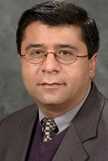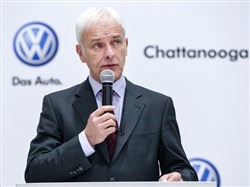VOL. 40 | NO. 13 | Friday, March 25, 2016
Dodging a disaster with Volkswagen?
By Jeannie Naujeck
Next month will mark five years since the first Passat rolled off the assembly line at Chattanooga’s Volkswagen plant. Most anniversaries are a cause for celebration.
But as Chattanoogans blow out the candles on this particular milestone they’ll be hoping that Volkswagen’s diesel emissions troubles will soon be extinguished, too, and that the new SUV model they’ll start producing this year will help VW emerge from the crisis a better and stronger company than before.
The U.S. Environmental Protection Agency announced in September 2015 that Volkswagen had violated the Clean Air Act by installing software in 11 million diesel cars that reduces the amount of harmful nitrogen oxide they emit during emissions tests.
Nearly half a million VW and Audi cars in the U.S. were reportedly affected, and a trusted brand with loyal followers was suddenly seemingly on shaky ground.
So, while Volkswagen and the U.S. Environmental Protection Agency negotiate a settlement over the dirty diesels, Chattanooga is taking a long view.

Wood
“We’re looking at this in terms of decades, not quarters,” says Charles Wood, vice president of economic and community development at the Chattanooga Area Chamber of Commerce.
“We’re optimistic on what they’re doing here for the long term. We haven’t been making cars that long in Chattanooga, so Volkswagen is an important part of our economy, but they’re not the only part.”
Hiring continues at the Chattanooga plant that employs 2,400 and is ramping up to make the CrossBlue midsize sports utility vehicle later this year.
Plant spokesman Scott Wilson says the $600 million expansion to create a second production line is “well underway.”
“We have not experienced job reductions or schedule changes, and there are no plans to do so,” Wilson adds.
VW ‘very methodical’
Suppliers who will make components for both VW and other automakers in the South also are holding job fairs this spring.
Over the past year, suppliers have announced well in excess of $250 million in investments for new and expanded facilities around Chattanooga.
“People were shocked at first by what happened, but I think now everyone feels comfortable that they’re going to make it through,” says Dan Gilmore, a labor and employment lawyer with Squire Strategies and a member of numerous business community organizations in Chattanooga.
Such optimism might seem incongruous in the face of Volkswagen’s troubles, with dire reports of company missteps coming every week and no resolution six months after the scandal broke.

Anand
Akshay Anand, automotive analyst for Kelley Blue Book, attributes the slow process to the company’s culture, calling Volkswagen “very methodical.”
“I think VW and the agencies are genuinely making sure they get things right but, at the same time, something has to happen soon,” he says.
“For every ounce of negativity that comes out for VW right now, they’re going to have to get 10 ounces of positivity. Because it’s so much easier to ruin a brand than it is to raise it up to No. 1.”
Fines, lawsuits, lost trust
Last summer Volkswagen was flying high, having surpassed Toyota as the No. 1 automaker in the world.
The Chattanooga plant had produced its 500,000th Passat and was looking ahead to producing a new vehicle for the U.S. market, the second largest in the world after China, through a $600 million expansion at the plant.
But the bubble burst exactly six months ago, when the EPA charged Volkswagen Group with installing software that sharply reduces the amount of harmful nitrogen oxide they emit when they are undergoing emissions testing. The affected diesel models include nearly half a million vehicles in the U.S.
Volkswagen’s stock plunged, sales dropped and the company faced federal fines of more than $18 billion dollars. There were lawsuits filed by car owners and investors, and separate legal actions by the state of California.
Perhaps most troubling, the brand lost value and the trust of many of its loyal and prospective VW customers.
Passat sales fell by about 30 percent in February compared to a year ago, and Volkswagen came in dead last in Fortune magazine’s 2016 ranking of the 100 largest companies by business reputation.
Two months ago, Matthias Mueller, CEO of Volkswagen Group, visited the Chattanooga plant to reiterate the company’s commitment to producing cars in America.
“Volkswagen firmly stands by the planned $900 million investment in the new mid-size SUV, a car that will create another 2,000 jobs,” Mueller told Chattanooga plant workers, calling it “crucial for Volkswagen’s future in America.”
Mueller has publicly stated that he is confident the company can restore its image in America, telling German press agency DPA:
“The great thing about the U.S. is that they sympathize with the underdog. In America, there is the possibility of seeing a renaissance by hard work. And that’s what we’re going to do.”
A multiplier effect
Not only is the $600 million expansion, first announced in July 2014, continuing at the VW plant, but suppliers are also building up their capacity.
Spanish supplier Gestamp Automocion, which makes stamped parts and welded assemblies, is investing $180 million in three projects in Chattanooga that will add 500 new workers to the 300 already here.
Yanfeng, a Chinese manufacturer that is the world’s largest supplier of interior auto components, is building a $55 million plant and holding job fairs to hire up to 350 people.
And French-owned Plastic Omnium Auto Exteriors is finishing up a $70 million plant at the Enterprise South industrial park that will produce bumpers and fenders and eventually employ 300 people.
The Chamber of Commerce markets Chattanooga as “the center of the automotive South,” and Wood notes that suppliers who locate there have the benefit of Tennessee’s business-friendly climate plus close proximity to other major car manufacturers other than VW.
Most automotive suppliers make parts for more than one manufacturer, and Chattanooga is within 180 miles of automotive factories for Nissan (Smyrna) and General Motors (Spring Hill), as well as BMW, Honda and Kia in adjacent states. Mercedes, Toyota, Hyundai and Ford plants are located within 300 miles.
“We’re still kind of in our infancy as an automaker, but it has had huge effects on Chattanooga, that’s for sure,” Wood says of landing Volkswagen.
“For us, the impact has been phenomenal. Not just the direct impact – people get a job and go to work, but there’s the ancillary impact of people buying a house and being able to buy things.
“That’s why automotive is looked upon by states as a key industry: it’s not just them; it’s their supply chain as well, and that combined impact is pretty big.”
What Wood is referring to are the multiplier effects from landing a company like Volkswagen, which not only employs lots of people who use their income to buy homes, cars, and other goods and services, but also makes big purchases of its own supplies, donates to local charities and attracts other companies.
‘Too big to fail?’
All that spending ripples through the economy, indirectly creating more jobs and income.
Volkswagen’s initial $1 billion investment in the Chattanooga assembly plant, including 2,415 jobs at the plant, created the equivalent of 12,400 full-time jobs in Tennessee, $643.1 million in income and $53.5 million in state and local tax revenue, according to an economic impact study authored by Bill Fox, director of the University of Tennessee Knoxville’s Center for Business and Economic Research (CBER), in May 2013.
Once up and running, the expanded operations would add about 9,800 full-time equivalent jobs in the state and about $372.6 million in new income, as well as $35.1 million in new tax revenue to state and local governments annually, according to a second CBER study published in May 2015.
Volkswagen received a package of incentives worth $577 million from federal, state and local governments to locate in Chattanooga. Efforts to lure VW also included extensive site preparation and road and infrastructure improvements.
VW will also get about $166 million in expansion incentives from the state, as well as about $52.5 million from local government.

Murat
“I don’t want to say ‘too big to fail,’ but it’s a great company,” says Dr. Murat Arik, director of the Business and Economic Research Center and assistant professor of management at MTSU’s Jones College of Business.
“Of course they did something wrong, but the company brand is very established and their contribution to this state’s economy is tremendous, so pulling the company out of here would create a big hole to fill.
“Having a global brand as part of our economic landscape is critically important to the economy. It puts the region on the world stage.”
Partnerships, investments
Volkswagen has also made sizable investments in local education through partnerships with institutions like Chattanooga State Community College, Hamilton County Schools and Oak Ridge National Laboratory.
Much of that comes back directly to the company in trained workers; its educational initiatives at CSCC include automation mechatronics and car mechatronics programs conducted at the Volkswagen Academy adjacent to its Chattanooga Operations plant.
Many programs benefit students who go on to work at other companies; Chattanooga State reports that engineering and technology graduates currently have their pick of multiple job offers.
Manufacturing employs about 32,000 in the local metropolitan area, but the Chamber projects 13,500 new jobs will be added over the next five years from new businesses and expansions, with most well-paying jobs requiring post-secondary training.
In response, business groups and educators are working on implementing a STEM (science, technology, engineering and math) based curriculum at all levels of education, all the way down to early childhood.
Arik says VW and its various investments help to create synergies among different segments of the economy.
“The network effect is a great way to stimulate and build an economy,” Arik says.
New SUV a smart choice
Volkswagen is smart to focus on an SUV as its new product.
U.S. auto sales hit a record 17.5 million in 2015, thanks to low interest rates and gas prices. Volkswagen did not benefit, falling 5 percent General Motors’ sales were up 5 percent and Ford sold the most vehicles.

Chattanooga auto workers assemble a Passat sedan at Volkswagen AG’s plant. The plant employs 2,400 and is in the process of a $600 million expansion to produce the CrossBlue small SUV. Another 2,000 workers are expected to be hired to build that vehicle.
-- Ap Photo/Erik Schelzig, FileBig sellers were small SUVs like the Honda CR-V, Toyota RAV4 and Nissan Rogue, which are replacing small and mid-sized cars like the Civic and Accord as their prices and gas mileage become more competitive.
“It’s the practicality of it. There’s more utility with SUVs, there’s more perception of safety because of ride height and the SUVs you’re seeing in the marketplace now get really comparable miles per gallon to sedans,” Anand says.
“And SUVs are becoming more fun, so there are more and more reasons to want an SUV that a sedan can’t replicate, and SUVs can now replicate many of the reasons that people were buying sedans.”
Anand says the VW scandal comes at a pivotal time for the company.
Over the last few years, as other automakers have delivered new products such as the hit Jeep Renegade, VW was in a transitional period as it retooled its manufacturing processes.
And though a leaked document from VW suggested the company might pull back from the U.S. market, Anand doubts that is true.
“We know there’s a lot of new product that’s gonna start hitting starting at the end of this year, the SUVs being made in Chattanooga,” he says.
“I don’t know that I see VW pulling out of the U.S. because they have so many good things going for them if they can kind of make it through the near term.”
The time is now
Whether consumers will forgive VW is the question.
VW’s long history and iconic car models like the Beetle and the Bus has inspired strong loyalty among its young and affluent core demographic.

“The great thing about the U.S. is that they sympathize with the underdog,” Volkswagen CEO Matthias Mueller explained to the German press. “In America, there is the possibility of seeing a renaissance by hard work. And that’s what we’re going to do.”
-- Ap Photo/Erik SchelzigKelley Blue Book conducted a survey shortly after the scandal broke and found that the vast majority of consumers said they would forgive Volkswagen – if it came up with a timely and effective fix.
“Time is of the essence for VW. The longer this gets dragged out, the more the brand gets hurt,” Anand says.
“I’ve seen the SUV; it’s a great looking car. I think it has the potential to do well,” Anand adds.
“But if this is still a cloud over their head when all this new product starts to be released, they’ve got serious issues.”
Volkswagen is attempting to clean up its image and operations as it negotiates with the EPA on remedies for the existing dirty diesels, as well as fines for violating the Clean Air Act.
In addition to CEO Martin Winterkorn, other heads have rolled, including that of Michael Horn, the former chief of Volkswagen of America, who resigned this month. The company also faces lawsuits from investors and separate legal actions by the state of California.
Just a part of a diverse economy
While Volkswagen has been a high-profile addition to Chattanooga, it’s just one part of a diverse economy that includes food and beverage, heavy equipment manufacturing and insurance.
McKee Foods, best known for making Little Debbie snack cakes, employs 2,800 people – more than Volkswagen. The area also has Chattanooga Bakery, which makes Moon Pies, and a Mars plant in nearby Cleveland that makes Twix Bars and M&Ms.
Heavy equipment is another top segment, with publicly-traded Astec Industries, which makes road building equipment, and Miller Industries, which makes tow trucks, both headquartered in Chattanooga, as well as a Komatsu plant that makes excavators and dump trucks.
Blue Cross Blue Shield of Tennessee, Unum and Cigna together employ more than 10,000 people in back office, call center and financial services.
And Amazon employs about 3,000 at a warehouse and distribution center near the VW plant.
Before the Volkswagen deal, Chattanooga had attracted foreign investment and developed a positive relationship with European companies including French pharmaceutical company Sanofi-Aventis, which makes over-the-counter Allegra in Chattanooga through its local subsidiary Chattem, and Alstom, a French company that has a sizable factory making turbines and other power generating equipment and was recently purchased by General Electric for $10.6 billion.
And Wacker Chemie, a German polysilicon manufacturer, built a $2.4 billion plant in adjacent Bradley County that just started operations in February and will employ 650 at full capacity.
Wacker moved to the area in 2009, shortly after Volkswagen.
It has established its own Wacker Institute at Chattanooga State to train students in chemical engineering technology and mechatronics.
“We’ve really become an international community in a short amount of time,” Wood says. “We’re kind of the European corner of the state.”
Indeed, Chamber recruiting literature is available in French and German languages, as well as Chinese, Japanese and Korean.
Moving too fast?
The city’s recruitment brochure for automotive suppliers boasts that area manufacturing wages are 17 percent below the national average, due to low unionization and the city’s low cost of living.
Average manufacturing wages are about $32,000 per year. Those wages can still go pretty far in Chattanooga, especially if there is a second wage earner in the household. Affordability and quality of life have long been selling points for companies and individuals looking to relocate to Chattanooga.
But as development transforms the city and home prices go up, some Chattanoogans worry that things are moving too fast.
Loft-style condominiums and upscale mixed-use developments are gentrifying the Southside, home to a Pilgrim’s Pride poultry plan, similar to the way in which Nashville’s Germantown industrial area has been transformed.
The downtown core is filling in with condos, and new home developments are going up near Volkswagen and Amazon, while home costs in the fashionable North Shore district are comparable to those in Nashville’s desirable neighborhoods.
Hamilton County’s population is projected to grow 8 percent by 2025, compared to 11 percent for Nashville-Davidson County.
Traffic congestion and housing affordability are starting to become issues, Wood acknowledges.
During the recession, Chattanooga saw an influx of displaced autoworkers from the North and Midwest attracted by the jobs at Volkswagen. But people are moving for plenty of other reasons.
‘Gig City’
Lately, Chattanooga has become a hot destination for the entrepreneurial and tech set. That’s by design.
Chattanooga launched the nation’s first municipal fiber optic broadband network in 2010, giving every home and business access to 1 gigabyte per second Internet service - and the capacity to transmit large amounts of data.
That has led to a startup culture in “Gig City” that is backed by an unusually large amount of angel and early-stage investment capital for a town its size.
Gilmore, who moved to Chattanooga for the second time in 2009, says the city has changed for the better. He and his family first lived in Chattanooga from 1990 to 1996 before moving to Nashville.
“It’s an entirely different experience, a whole different life,” he explains of their return in 2009.
“It’s become a crossroads for a lot of different types of people and it’s a lot more interesting from a cultural and business standpoint.”
Since 2010, 91 new companies have launched in Chattanooga representing about $50 million in venture capital, according to the Ewing Marion Kauffman Foundation’s report, “Little Town, Layered Ecosystem: A Case Study of Chattanooga,” published in February.
The report notes that Chattanooga has a long history of collaboration between the public and private sector to solve problems from cleaning up pollution - the city was deemed America’s most polluted in 1969 - and developing its riverfront to transforming its economy through initiatives like municipal high-speed Internet.
The city has designated 140 acres downtown as the Chattanooga Innovation District, a home for the entrepreneurial ecosystem in a dense, walkable urban core.
“Chattanooga has woven entrepreneurship into its civic pride,” the report notes.
Last year, Outside magazine ranked Chattanooga No. 1 on its annual “Best Places to Live” list, gushing over the city as “a dream burg,” “the best town ever” and “like the love child of Nashville and Silicon Valley, but with more singletrack” (mountain bike trails).
At the other end of the spectrum, Chattanooga also made Money magazine’s top ten list of “Best Places to Retire” last year and was cited as “incredibly affordable and culturally diverse.”
But it’s the economic diversity that’s keeping the engine humming lately.
“We are fortunate to have a very diverse market here that has been very helpful to us historically,” Wood says.
“We don’t want to be dominated by any one industry. Diversity served us well during the recession and it’s important for us to maintain and grow it.”